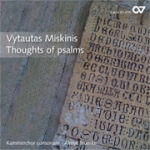For most listeners, including choral music enthusiasts, this disc’s subtitle, “Contemporary choral music from Lithuania”, isn’t likely to spark the recall of a list of familiar works or even composer names. Here is territory that to say the least is unfamiliar–and yet, as proved by this long-overdue program devoted to works by Vytautas Miškinis (b. 1954), is well-worth getting to know. Works by Miškinis occasionally turn up on a compilation program–for instance, a recent release (Baltic Exchange) on Hyperion with the Choir of Trinity College, Cambridge (type Q12694 in Search Reviews)–and each time the one Miškinis piece among many others distinguishes itself. It invariably makes you want to hear more. And so, now we can.
All the works on this program, sung with expert technique and impeccable ensemble by the 25-voice Kammerchor consonare, are squarely in the tonal world, yet the “quartal/quintal” basis for much of the harmony–enlivened by added seconds and occasional clusters–ensures just enough ambiguity to keep us listening expectantly and openly. Your first reaction on hearing the opening Gloria is likely to be–wow, a 21st-century composer who writes in a modern idiom, with a true understanding and mastery of the special character and capability of voices in ensemble, but who remains firmly committed to the oft-disdained key to all the best, most memorable, longest-surviving choral music: singability.
Although the 18 works on the program would not fall into the “easy” category, neither are they treacherously difficult (as some composers seem to delight in writing), and many are absolutely accessible to the better amateur choirs, likely a reflection of Miškinis’ training and long involvement in the “real world” of conducting his own groups. Indeed, it’s really remarkable to find a program of works by a modern choral composer whose every selection is clearly written with both singer and listener in mind.
Although we may have heard this kind of harmony before, it’s Miškinis’ reverence for text–and his uncommon affinity for word-setting–that makes these works, well, sing the way they do. He has an impressive facility for melody–listen to the gorgeous Ave Maria and to the chant-like (impressions of Duruflé) Tu es. And then there’s the uplifting Cantate Domino (one of several settings Miškinis has made of this text), an almost too-catchy, pop-influenced motet that you’ll not stop singing for days.
But then there is the exquisitely wrought O salutaris, a masterpiece of choral color, effervescent rhythm, and vibrant harmonic character, enhanced by what may be some aleatoric effects–also apparent in the astonishing Dum medium silentium, a highlight of the disc whose music and performance embody the words “virtuoso” and “inspired”. It would be easy to go on–commenting for instance on the economy and consistently high quality of the writing in the title work, a set of seven pieces, mostly psalms, every one of which is worthy of church or concert performance.
In fact, there’s not a weak link on this entire program–and Kammerchor consonare obviously knows and respects this composer just as he clearly knows and respects singers and choral music. The sound, from a Hamburg church, is first rate. My only complaints: precious little information is given in the liner notes about the music (there’s nothing at all about the Thoughts of psalms); translations are given only in German; and, if you want to order the few scores available from the sheet music publishing arm of Carus, you have to order a minimum of 20 copies, sight unseen–not a great way to encourage conductors to take a chance on a newly discovered composer. That issue aside, this is one of the best choral recordings of 2010, an essential disc for every true lover of choral music. [1/14/2011]
































